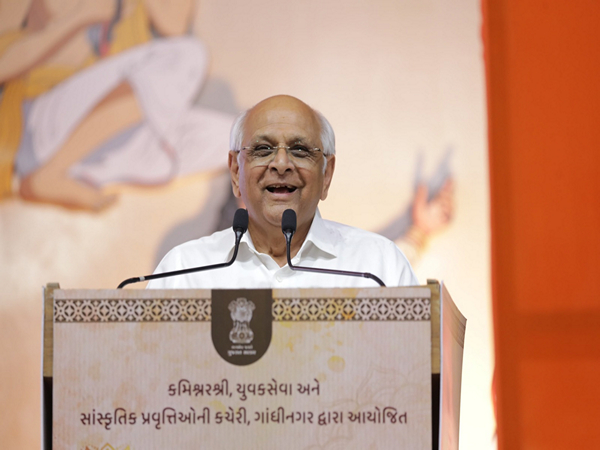India under constant attack through disinformation, false propaganda: PM Modi
Jul 18, 2022

New Delhi [India], July 18 : Highlighting the challenges of national security and new forms of warfare, Prime Minister Narendra Modi on Monday said as India is establishing itself on the global stage, there are constant attacks through misinformation, disinformation and false propaganda.
Addressing the gathering at Naval Innovation and Indigenisation Organisation (NIIO) Seminar 'Swavlamban', Modi said, "Now the threats to national security have also become widespread, the methods of warfare are also changing. Earlier we used to imagine our defence only till land, sea and sky. Now the circle is moving towards space, moving towards cyberspace, moving towards economic, social space."
In such a scenario, the Prime Minister said that the country has to move anticipating the future challenges and bringing changes accordingly. He said self-reliance will help the country a great deal in this regard.
Warning against the emerging dangers, Modi said, "We also have to intensify our war against forces challenging India's self-confidence, our self-reliance. As India is establishing itself on the global stage, there are constant attacks through misinformation, disinformation and false propaganda. Keeping the faith, the forces that are harming India's interests, whether in the country or abroad, have to be thwarted in their every effort. National defence is no longer limited to borders but is much broader. Therefore it is equally necessary to make every citizen aware about it."
He emphasised that the goal of self-reliance in the Indian defence forces is very important for the India of the 21st century.
The Prime Minister said that the resolution of creating 75 indigenous technologies in this period of making new resolutions for India is inspiring in itself and he expressed the confidence that it will be fulfilled very soon. Still, he said that this is kind of the first step. "We have to work to continuously increase the number of indigenous technologies. Your goal should be that when India celebrates 100 years of its independence, at that time our Navy should be at an unprecedented height", he added.
Referring to the importance of oceans and coasts in India's economy, the Prime Minister said that the role of the Indian Navy is continuously increasing and therefore self-reliance of the Navy is of critical importance.
Recalling the glorious maritime tradition of the country, the Prime Minister said that the defence sector of India used to be very strong even before independence. At the time of independence, there were 18 ordnance factories in the country, where many types of military equipment including artillery guns, were made in the country. India was an important supplier of defence equipment in World War II.
"Our howitzers, machine guns made at the Ishapur Rifle Factory, were considered the best. We used to export a lot. But then what happened that at one point in time we became the world's biggest importer in this field?" he asked.
He said like the countries who capitalized on the challenge of the World War to emerge as the big arms exporters, India too turned adversity into opportunity during the Corona period and made strides in economy, manufacturing and science.
He lamented the fact that during the initial decades of the Independence, there was no focus on the development of defence production and research and development was severely limited due it being restricted to the government sector. "Innovation is critical and it has to be indigenous. Imported goods cannot be a source of innovation," he said. He also stressed the need for a change in the mindset of attraction for imported goods.
Prime Minister said that the self-reliant defence system is critical for the economy and also from the strategic point of view. He said that the country has worked in mission mode to reduce this dependence after 2014.
He remarked that the government has given new strength to our public sector defence companies by organizing them in different sectors.
"Today we are making sure that we connect our premier institutions like IITs with defence research and innovation. Learning from the approach of the past decades, today we are developing a new defence ecosystem with the strength of everyone's efforts. Today defence research and development has been opened for the private sector, academia, MSMEs and start-ups," he added. This has led to a new speed in long pending defence projects and the Prime Minister expressed the confidence that the wait for the commissioning of the first indigenous aircraft carrier will be over soon.
In the last 8 years, the Prime Minister noted that the government has not only increased the defence budget but also ensured that this budget is useful in the development of the defence manufacturing ecosystem in the country itself. Today, a large part of the budget earmarked for the purchase of defence equipment is being spent on procurement from Indian companies. He also complimented the defence forces for preparing a list of 300 items that will not be imported.
In the last 4-5 years, the Prime Minister said that the defence imports have come down by about 21 per cent. "Today we are moving fast from the biggest defence importer to a big exporter. Last year defence exports worth Rs 13,000 crore was done with more than 70 per cent of that from the private sector," he pointed out.
The seminar aims to engage Indian industry and academia towards achieving self-reliance in the defence sector. The two-day Seminar (July 18-19) will provide a platform for leaders from industry, academia, services and government to come together on a common platform to ideate and come up with recommendations for the defence sector.




















